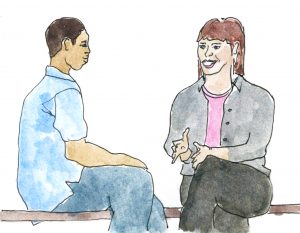Cultivating Difficult Dialogues
November 10, 2016
Ever feel as though your professors have forgotten what it’s like being a student? For several professors involved in Whitman’s Cultivating Difficult Dialogues program, that experience is fresh in their memories.
Started in 2014 by Associate Dean for Faculty Development Lisa Perfetti and the Center for Teaching and Learning, the Cultivating Difficult Dialogues program consists of seven workshops over the course of the semester in which faculty and staff learn about and discuss ways to promote and accommodate discussion of touchy topics like race, gender, sexuality and religion. Perfetti got the idea from a similar program, called Cultivating Controversial Conversations, at Muhlenberg College in Pennsylvania, where she worked as a French professor before coming to Whitman.
“It’s hard to talk about things like race, sexuality, religion– things that we hold dear as part of our identities, and things that we know can cause people to feel left out, or hurt, or marginalized. And rather than engaging in these issues openly, we often just avoid them, or we dance around them so carefully,” Perfetti said of the purpose of the workshops. “We all need to get better about talking about things, because they come up, whether we try to avoid them or not. So it’s better to learn some skills for actually engaging with them, and what better place than the classroom?”
Five of those seven workshops have already passed this semester, which boasts the largest cadre of participants to date– 11 people, according to Perfetti. The first and second years of the program had five and eight participants respectively.
The program functions in many ways like a discussion section of a class– except that the participants are almost all members of the faculty, to whom Perfetti e-mails a mass invitation to sign up each year. Participants read excerpts from books like Susan Ambrose’s How Learning Works to prepare for each workshop, and spend workshop time talking about ways to apply their studies to teaching and managing classroom environments.
The program is led by a different professor each year, who serves in many ways like the professor of any other class at Whitman, facilitating discussion about a given session’s readings. This year, that leader is sociology professor Helen Kim. It’s the first time Kim has been a part of the program, and she believes that discussing topics like trigger warnings, privilege, multiculturalism and how to navigate dialogues around those and other controversial subjects has been helpful to her and her colleagues.
“It’s been really good in terms of… thinking about practical things that one can do in the classroom,” Kim said. “There’ve been things that I think we all have benefited from.”
The program is not all professors, though. Residence Director Louise Fix ‘14 is also a participant, and seeks to apply the things she learns in the program to her work in Lyman Hall.
“One of the things that Residence Life stands by is this idea of education outside of the classroom– you aren’t just sleeping in your residence hall, you’re learning and living in your residence hall,” Fix said. “Somebody might hear something, or talk about something in class, and then bring it back to the residence hall….That… conversation just doesn’t end in the classroom.”
She also commented on the experience of being in class with professors, some of whom had
taught her when she attended Whitman as a student.
“Being in an environment with [professors] where we’re talking on a level playing field– I think that’s been a really unique experience.” Fix said. “And having open, honest conversation about what needs to be different in the classroom with a changing student body.”






